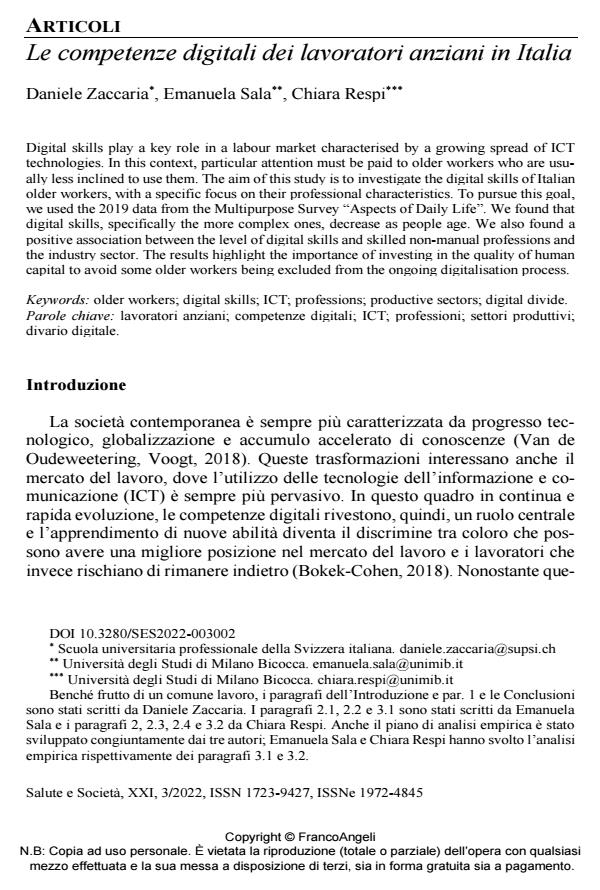Le competenze digitali dei lavoratori anziani in Italia
Titolo Rivista SALUTE E SOCIETÀ
Autori/Curatori Daniele Zaccaria, Emanuela Sala, Chiara Respi
Anno di pubblicazione 2022 Fascicolo 2022/3
Lingua Italiano Numero pagine 17 P. 9-25 Dimensione file 454 KB
DOI 10.3280/SES2022-003002
Il DOI è il codice a barre della proprietà intellettuale: per saperne di più
clicca qui
Qui sotto puoi vedere in anteprima la prima pagina di questo articolo.
Se questo articolo ti interessa, lo puoi acquistare (e scaricare in formato pdf) seguendo le facili indicazioni per acquistare il download credit. Acquista Download Credits per scaricare questo Articolo in formato PDF

FrancoAngeli è membro della Publishers International Linking Association, Inc (PILA), associazione indipendente e non profit per facilitare (attraverso i servizi tecnologici implementati da CrossRef.org) l’accesso degli studiosi ai contenuti digitali nelle pubblicazioni professionali e scientifiche.
Digital skills play a key role in a labour market characterised by a growing spread of ICT technologies. In this context, particular attention must be paid to older workers who are usual-ly less inclined to use them. The aim of this study is to investigate the digital skills of Italian older workers, with a specific focus on their professional characteristics. To pursue this goal, we used the 2019 data from the Multipurpose Survey "Aspects of Daily Life"!. We found that digital skills, specifically the more complex ones, decrease as people age. We also found a positive association between the level of digital skills and skilled non-manual professions and the industry sector. The results highlight the importance of investing in the quality of human capital to avoid some older workers being excluded from the ongoing digitalisation process.
Parole chiave: lavoratori anziani; competenze digitali; ICT; professioni; settori produttivi; di-vario digitale.
- Human Aspects of IT for the Aged Population Daniele Zaccaria, Emanuela Sala, Federica Cretazzo, pp.302 (ISBN:978-3-031-34865-5)
- Digital Media Domestication and Job Paths Among Older People: An Ethnographic Investigation Simone Carlo, Giulia Buschicchio, in Media and Communication /2023
DOI: 10.17645/mac.v11i3.6710 - Human Aspects of IT for the Aged Population Fausto Colombo, Piermarco Aroldi, Simone Carlo, pp.457 (ISBN:978-3-031-34916-4)
Daniele Zaccaria, Emanuela Sala, Chiara Respi, Le competenze digitali dei lavoratori anziani in Italia in "SALUTE E SOCIETÀ" 3/2022, pp 9-25, DOI: 10.3280/SES2022-003002